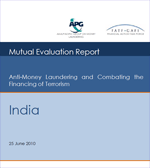Ce rapport est une synthèse des mesures en matière de lutte contre le blanchiment de capitaux (LBC) et le financement du terrorisme (FT) en vigueur en Inde au moment de la visite sur place par l'équipe d'évaluateurs immédiatement après. Le rapport décrit et analyse ces mesures, indique le niveau de conformité de l'Inde avec les Recommandations (40+9) du GAFI et fait des recommandations sur les mesures à prendre pour renforcer certains aspects du système.
Le rapport et le synthèse du rapport sont disponibles en anglais uniquement.
Key Findings
- Money laundering (ML) methods are diverse. India has several mechanisms in place for domestic co-ordination and co-operation at both the policy and operational levels to identify new and emerging trends and to formulate appropriate responses.
- India continues to be a significant target for terrorist groups and has been the victim of numerous attacks. There are no published figures of terrorist cells operating in the country.
- Since mid-2009, India has increased its focus on money laundering and the use of the ML provisions. However, there are still some important and in some instances, long-standing legal issues, such as the threshold condition for domestic predicate offences, that remain to be resolved. Effectiveness concerns are primarily raised by the absence of any ML convictions.
- India’s serious commitment to combating terrorism in all its forms must be acknowledged. From a law enforcement perspective, this commitment is reflected in an active pursuit of the financial aspects of terrorism. At the prosecutorial level, an appropriate focus on FT can be observed. However, this effort has not yet been convincingly followed up by convictions and firm case law.
- India has progressively expanded and strengthened its preventive measures for the financial sector, which now apply to all but one of the financial activities required to be covered under the FATF standards. However, several preventive provisions need to be brought more closely into line with the FATF standards, and overall, more time is needed before all requirements are substantially implemented.
- With the exception of casinos (which operate only in the State of Goa), the Designated Non Financial Businesses and Professions sectors are not subject to the PMLA and are not regulated and supervised for AML/CFT purposes.
Key recommendations made to India include the need to:
- address the technical shortcomings in the criminalisation of both money laundering and terrorist financing and in the domestic framework of confiscation and provisional measures;
- broaden the CDD obligations with clear and specific measures to enhance the current requirements regarding beneficial ownership;
- improve the reliability of identification documents, the use of pooled accounts, PEPs, and non-face-to-face business; ensure that India Post, which recently became subject to the PMLA, effectively implements the AML/CFT requirements;
- enhance the effectiveness of the STR reporting regime; enhance the effectiveness of the financial sector supervisory regime and ensure that India Post is adequately supervised;
- ensure that the competent supervisory authorities make changes to their sanctioning regimes to allow for effective, proportionate and dissuasive sanctions for failures to comply with AML/CFT requirements; and
- extend the PMLA requirements to the full range of DNFBPs, and ensure that they are effectively regulated and supervised.


 Twitter
Twitter
 Facebook
Facebook
 Instagram
Instagram
 Linkedin
Linkedin
